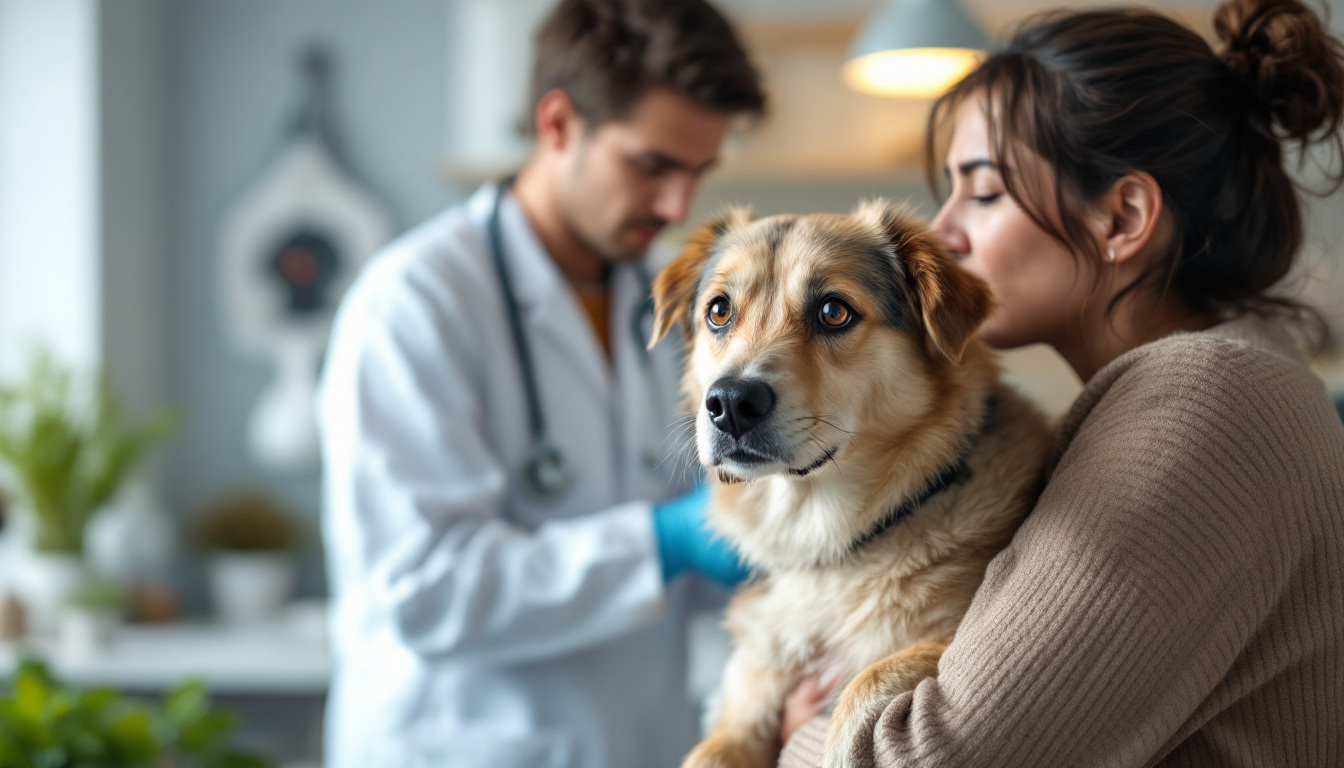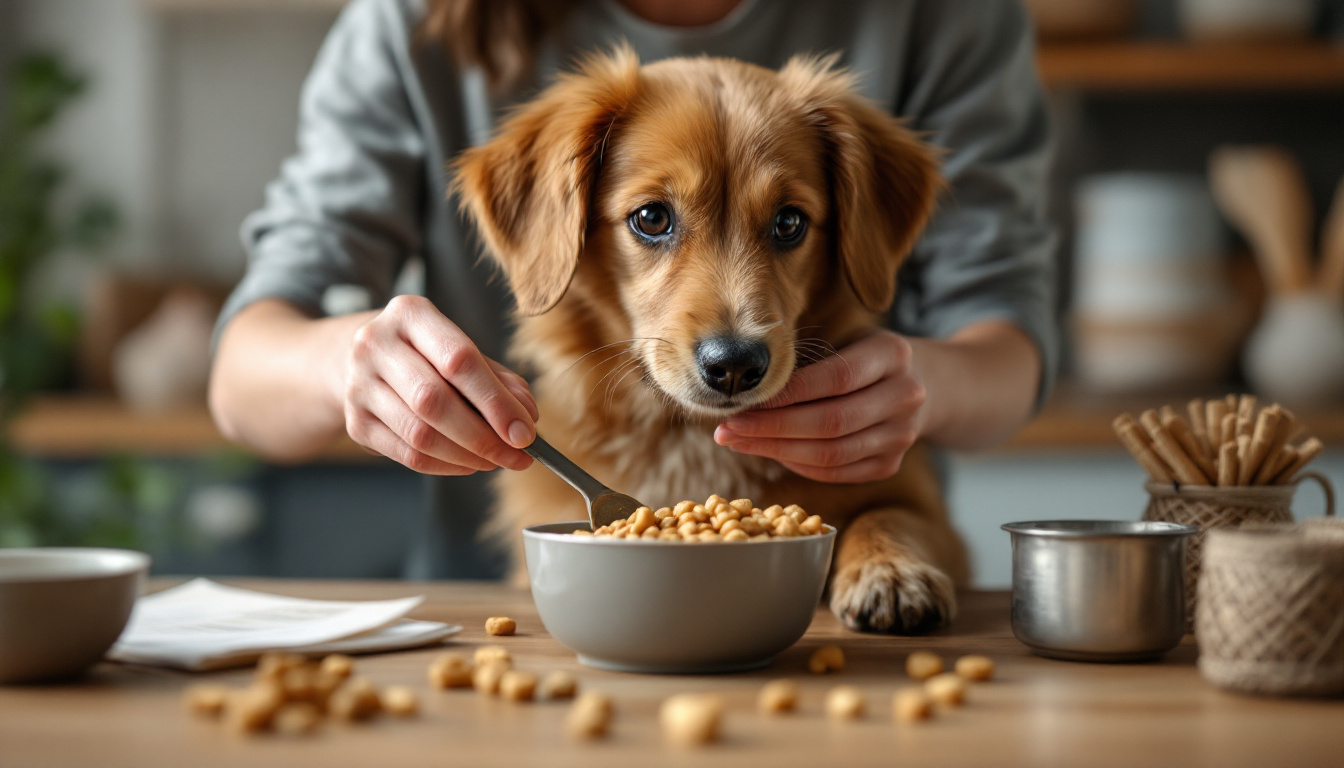Physical Address
304 North Cardinal St.
Dorchester Center, MA 02124
Physical Address
304 North Cardinal St.
Dorchester Center, MA 02124
When your dog experiences diarrhea, it can be a worrying and uncomfortable time for both of you. Diarrhea in dogs is quite common—studies show that over 8% of dogs experience acute diarrhea annually, and thankfully, most cases resolve quickly with minimal intervention. However, knowing what to feed your dog during this time is crucial to help restore their digestive health and prevent further complications.
In this article, we’ll explore effective dietary strategies for managing canine diarrhea, discuss when to seek veterinary care, and highlight the latest insights on treatments that support gut health without over-reliance on antibiotics. Whether your dog’s diarrhea is mild or persistent, understanding the right foods to offer can make a big difference in their recovery.
Diarrhea in dogs can arise from a variety of causes, ranging from minor dietary indiscretions to infections or underlying health conditions. Acute diarrhea is typically short-lived and often resolves after a single veterinary visit, as noted in a study published in PLOS ONE which found that over 80% of cases improve quickly.
Common triggers include sudden changes in diet, ingestion of spoiled food, stress, parasites like Giardia, or bacterial infections. Interestingly, a recent FDA approval of metronidazole oral suspension for Giardia treatment marks an important step in managing this specific cause of diarrhea in dogs (AAHA report).
While antibiotics have traditionally been used to treat diarrhea, emerging research suggests that their routine use may not always be necessary or beneficial. A 2023 study found no significant difference in recovery rates between dogs treated with antibiotics and those who were not, encouraging a more cautious approach to antimicrobial use (Bark & Whiskers study).
In addition to the aforementioned causes, dietary sensitivities can also play a significant role in canine diarrhea. Many dogs may react adversely to certain ingredients in their food, such as grains, dairy, or specific proteins. This can lead to gastrointestinal upset and diarrhea, prompting pet owners to consider elimination diets or hypoallergenic food options. Monitoring a dog’s response to dietary changes can provide valuable insights into their digestive health and help identify potential allergens.
Moreover, environmental factors such as sudden changes in routine or exposure to new surroundings can contribute to stress-induced diarrhea. Dogs are creatures of habit, and disruptions in their daily life, such as moving to a new home or changes in family dynamics, can lead to anxiety. This stress can manifest physically, resulting in gastrointestinal disturbances. Pet owners should be mindful of their dog’s emotional well-being and consider gradual transitions or calming aids to help alleviate stress-related symptoms.
Feeding your dog the right foods during diarrhea is essential to help soothe their digestive system, replenish lost nutrients, and promote healing. The gastrointestinal tract is delicate when inflamed or irritated, so bland, easy-to-digest meals are often recommended by veterinarians.
One of the most common and effective dietary recommendations is a bland diet consisting of cooked lean proteins and simple carbohydrates. For example, cooked lean ground turkey paired with plain white rice is gentle on the stomach and provides necessary energy without overwhelming the gut (dog-health-guide.org).
This combination is low in fat and fiber, which helps reduce intestinal workload and allows the gut lining to recover. Additionally, feeding smaller, more frequent meals rather than one or two large meals can ease digestion and prevent further irritation.
While it might be tempting to feed your dog their regular meals or treats, certain foods can exacerbate diarrhea. Avoid fatty, spicy, or highly processed foods, as well as dairy products, which many dogs have difficulty digesting. Also, refrain from giving bones or raw diets until your dog’s stool normalizes.
In addition to avoiding certain foods, it’s crucial to monitor your dog’s hydration levels. Diarrhea can lead to significant fluid loss, which can quickly result in dehydration. Ensure your dog has constant access to fresh water, and consider offering an electrolyte solution specifically formulated for pets to help replenish lost fluids and minerals. Some pet owners find that adding a little low-sodium chicken broth to their dog’s water can encourage them to drink more, thus aiding in their recovery.
Furthermore, introducing probiotics can also be beneficial during this time. Probiotics are live bacteria that can help restore the natural balance of gut flora, which may be disrupted during episodes of diarrhea. Many veterinarians recommend specific probiotic supplements designed for dogs, which can be easily mixed into their bland diet. This can not only help in the recovery process but also support your dog’s overall digestive health in the long run.
Beyond bland diets, some pet owners and veterinarians turn to probiotics and other alternative therapies to support gut health during episodes of diarrhea. Probiotics can help restore the natural balance of beneficial bacteria in the digestive tract, which may be disrupted during illness or antibiotic treatment.

A review of referral cases at a teaching hospital in Liverpool found that up to 26% of dogs treated for diarrhea received alternative therapies, including probiotics (dvm360.com).
While probiotics are not a cure-all, they can be a helpful adjunct to dietary management, especially in chronic or recurrent cases. It’s best to consult your veterinarian before starting any supplements to ensure they are safe and appropriate for your dog’s specific condition.
In addition to probiotics, other alternative therapies such as prebiotics, digestive enzymes, and herbal remedies are gaining popularity among pet owners seeking holistic approaches to their pets’ health. Prebiotics, which serve as food for beneficial gut bacteria, can enhance the effectiveness of probiotics by promoting the growth of these good bacteria. Meanwhile, digestive enzymes can aid in breaking down food more effectively, which may alleviate some digestive issues and improve nutrient absorption.
Herbal remedies, such as slippery elm and pumpkin, are also being explored for their soothing properties on the gastrointestinal tract. Slippery elm contains mucilage, which can help coat the intestinal lining, while pumpkin is rich in fiber and can help regulate bowel movements. However, it is crucial to approach these therapies with caution and to work closely with a veterinarian who understands the nuances of alternative treatments to ensure the best outcomes for your furry friend.
Most cases of acute diarrhea in dogs resolve quickly, but certain signs warrant prompt veterinary attention. If your dog’s diarrhea persists beyond a couple of days, is accompanied by vomiting, lethargy, blood in the stool, or signs of dehydration, it’s important to seek professional care.

Veterinarians may perform diagnostic tests to identify underlying causes such as infections, parasites, or inflammatory bowel disease. Given concerns about antibiotic resistance—studies have found multidrug-resistant E. coli in many pet dog diarrhea samples—vets are increasingly cautious about prescribing antibiotics unless clearly indicated (CIDRAP study).
For working dogs, like police dogs, who may be more prone to diarrhea due to stress or environmental exposure, early intervention is especially important. Research shows that over 10% of Portuguese police dogs experience diarrhea, highlighting the need for careful management in active working animals (BMC Veterinary Research).
In addition to the physical symptoms, behavioral changes can also be a red flag. If your dog becomes unusually withdrawn, refuses food, or shows signs of discomfort, these can indicate that the diarrhea is more than just a minor issue. Dogs are adept at masking pain, so any noticeable shift in their demeanor should be taken seriously. Monitoring your dog’s water intake is equally crucial; dehydration can escalate quickly in cases of diarrhea, and ensuring your pet stays hydrated can prevent further complications.
Moreover, it’s essential to consider the potential dietary factors that could contribute to gastrointestinal upset. Sudden changes in diet, ingestion of table scraps, or exposure to toxins can all lead to diarrhea. Keeping a close eye on what your dog eats and maintaining a consistent feeding routine can help mitigate these risks. If you suspect that a specific food or treat may be the culprit, discussing it with your veterinarian can provide valuable insights into how to adjust your dog’s diet for optimal digestive health.
Feeding a dog with diarrhea involves patience, care, and attention to their unique needs. Start with a bland diet of cooked lean proteins and simple carbohydrates, such as turkey and rice, feeding small, frequent meals. Avoid fatty or irritating foods and consider probiotics as a supportive therapy under veterinary guidance. It’s also essential to ensure your dog stays hydrated, as diarrhea can lead to significant fluid loss. Offering fresh water frequently and, in some cases, an electrolyte solution designed for pets can help maintain their hydration levels.

Remember that while most acute diarrhea cases resolve quickly, persistent or severe symptoms require professional evaluation. In addition to dietary adjustments, monitoring your dog for other signs of distress, such as lethargy or vomiting, is crucial. These symptoms can indicate a more serious underlying issue that needs immediate veterinary attention. With the right diet and care, your dog’s digestive health can bounce back, helping them feel comfortable and happy again soon.
For more information on managing canine diarrhea and the latest veterinary recommendations, check out the expert insights on antibiotic use from the University of Minnesota College of Veterinary Medicine. Additionally, consider keeping a journal of your dog’s eating habits and any episodes of diarrhea, as this can provide valuable information for your veterinarian. Tracking what foods your dog tolerates well can help in formulating a long-term diet plan that supports their digestive health and prevents future incidents.
Diarrhea can be particularly challenging for older dogs, whose digestive systems are more delicate and require extra care. At CaringForOldPets, we specialize in helping pet owners navigate the complexities of caring for senior dogs. With our expert-approved tips on nutrition and wellness, you can ensure that your aging companion receives the best care possible during these sensitive times. Learn More about how to support your senior dog’s digestive health and overall well-being on our website.